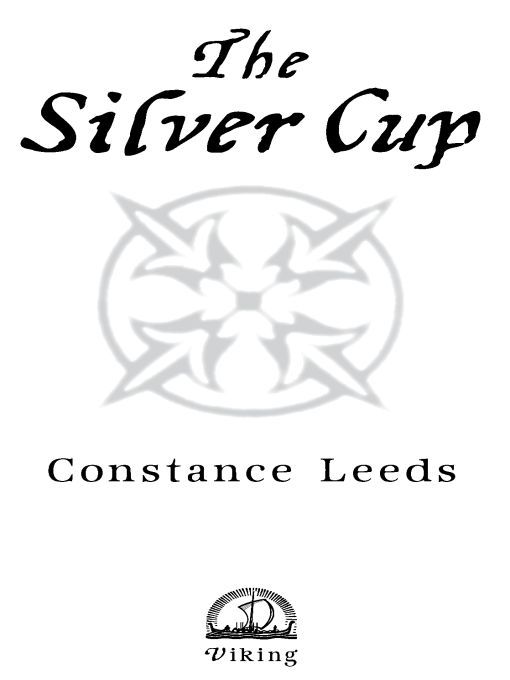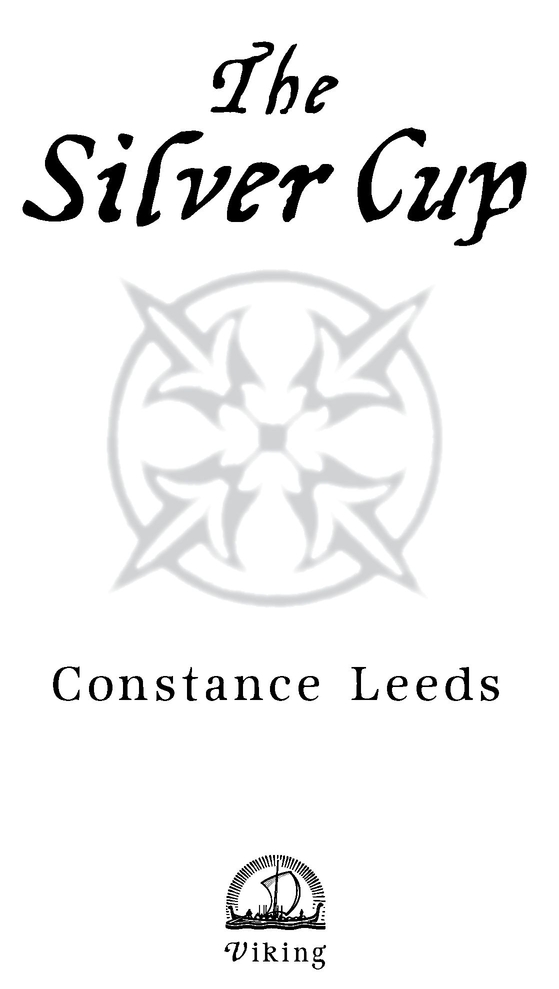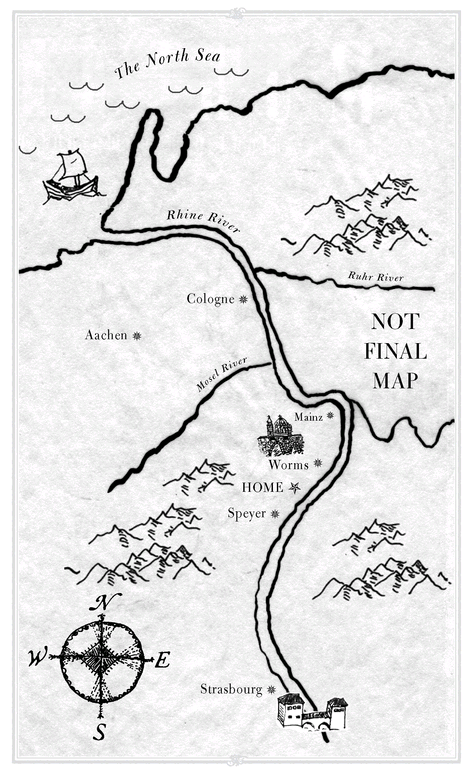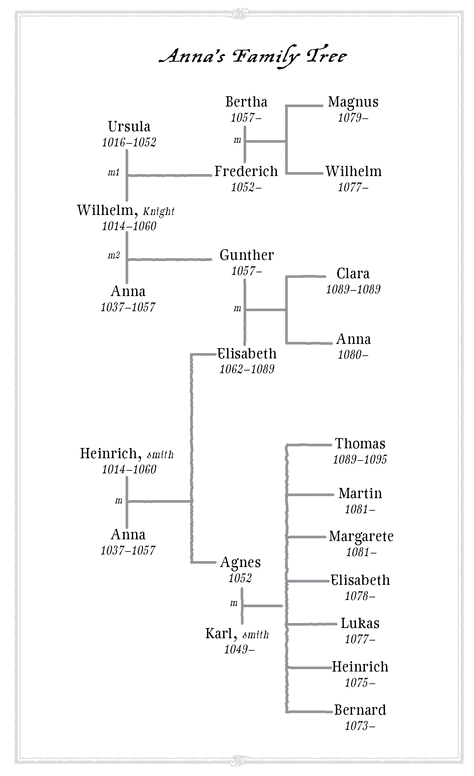The Silver Cup
Authors: Constance Leeds

Table of Contents
Â
Â
Â
Â
Â
Â
IT'S THE YEAR 1095
, and fifteen-year-old Anna longs for a different life in her small German village. But as the seasons turn, the year proves anything but ordinary.
, and fifteen-year-old Anna longs for a different life in her small German village. But as the seasons turn, the year proves anything but ordinary.
Her youngest cousin, Thomas, disappears, and Anna suspects his mother of an unspeakable crime. Another cousin, Martin, runs away to join a renegade army of Crusaders, who bring murder and destruction to Jews in the nearby city of Worms.
When Anna risks everything to rescue Leah, an orphaned Jewish girl whose only connection to her family is a silver cup, the two girls forge a remarkable friendship that defies the intolerance of their time.
Filling her story with fascinating period details, debut novelist Constance Leeds paints a rich, colorful picture of an eleventh-century life marked by courage, will, and most of allâhope.
Constance Leeds
is a retired lawyer and the mother of three grown children with whom she once operated a less than profitable poultry farm. She lives on the banks of the Charles River, near Boston, Massachusetts. Research for this story took her to the banks of the Rhine, to the cities of Worms and Strasbourg.
is a retired lawyer and the mother of three grown children with whom she once operated a less than profitable poultry farm. She lives on the banks of the Charles River, near Boston, Massachusetts. Research for this story took her to the banks of the Rhine, to the cities of Worms and Strasbourg.
The author considered dedicating this book to her devoted corgis, Puck and George Eliot, but she did not. Visit the author at
www.constanceleeds.com
www.constanceleeds.com
Â
Â
The Silver Cup
Â
The Silver Cup
Constance Leeds
eISBN : 978-0-670-06157-0
Ages: 12 up
Grades: 7 up
Pages: 224
Trim size: 5½ x 8¼
On Sale: April 5, 2007
Rights: World
Price: $16.99 / (CAN $21.00)
Grades: 7 up
Pages: 224
Trim size: 5½ x 8¼
On Sale: April 5, 2007
Rights: World
Price: $16.99 / (CAN $21.00)
Text copyright © Constance Leeds, 2007
Â
All rights reserved.
All rights reserved.

For Billy, now and always
Â
(With love to Lauriston, Corey, and Will)
(With love to Lauriston, Corey, and Will)


FALL
1
THE SILVERSMITH
September 20, 1095
Â
Anna blinked, closed her eyes tightly, and drew the coarse cloth over her face. She turned toward the wall, until her father tapped her shoulder again.
Anna blinked, closed her eyes tightly, and drew the coarse cloth over her face. She turned toward the wall, until her father tapped her shoulder again.
“Anna.”
She rolled back and unfolded herself from the covers.
“Anna.”
“Is it morning, Father?”
“Almost.”
“Is something wrong?”
“No. I want an early start for Worms. It's market day. Would you like to come?”
“Oh, yes!” said Anna, rubbing her eyes and springing from the bed.
In an instant, she had pulled on her green homespun kirtle and fastened her belt. Meanwhile, her cousin Martin stretched, yawned, and slowly rolled to his feet, reluctant to surrender the wide bed he shared with his uncle and his cousin Anna. Martin shook his head of blond curls and muttered to himself about the unfairness of his day.
Anna hummed as she ladled ale into cups of horn. She served her father and Martin chunks of bread to dip in a bowl of buttermilk, and they sat on three stools gathered in the narrow pool of light that streamed through the open door.
“Why isn't Martin going to Worms today? ” asked Anna, delighted by the prospect of a journey.
“Your cousin is helping his brothers today. I have tools to deliver, and we need more salt. We'll leave shortly.”
“Lucky Anna! A trip to the city while I haul sacks of flour. You'll have an easy day, so you won't need this,” said Martin as he swiped Anna's portion of bread and jammed it in his mouth.
Anna didn't care; for once,
she
would be the one going to the city. It was her sixteenth fall, but she had been to Worms, a cathedral city on the near bank of the Rhine River, only a handful of times. Though Martin was six months younger, he had traveled to Worms countless times helping her father, Gunther. Anna was feeling almost smug as they bid farewell to Martin, who spewed bread particles when he attempted to reply with his overstuffed mouth.
she
would be the one going to the city. It was her sixteenth fall, but she had been to Worms, a cathedral city on the near bank of the Rhine River, only a handful of times. Though Martin was six months younger, he had traveled to Worms countless times helping her father, Gunther. Anna was feeling almost smug as they bid farewell to Martin, who spewed bread particles when he attempted to reply with his overstuffed mouth.
The cool fields smoked in the warm morning sunlight, and the horse, with its two riders, plodded steadily along the busy road. There were very few horses in her village and none so grand as Gunther's large black mare. Anna felt very proud, seated behind him. Gunther carried a small package of ash-handled hammers, delicate chisels, and a tiny anvil. Anna had laughed when she had seen the tools.
“Has Uncle Karl become the blacksmith for a dwarf ? ”
“For a silversmith.”
The horse splashed across a stream whose clear water moved quickly southward to the wide, north-flowing Rhine River and the city of Worms. Dust from the dry road coated Anna's dampened shoes as the path ribboned through rich green fields and along hillsides dotted with vineyards. Deep woods ringed the cultivated fields. Ageless and untamed, the forest was both necessary and terrifying to the sixty German households in her town, huddled within a wooden palisade that served as both boundary and protection. For most of Anna's neighbors, this town was all the world that they needed or even wanted to know.
On a rise that overlooked the town and countryside was the marlstone wall of the manor house where Gunther was born. Though the manor was now the home of his half brother, Anna had never been inside because when her father married her mother, a blacksmith's daughter, his noble family had recognized neither the marriage nor, thereafter, Gunther.
Passing through the fields, Gunther greeted fellow townspeople with a wordless nod. Beyond memory, Anna's mother's people had been smiths in the town, and always freemen. But their iron ore came from pits in the manor's marshes and the charcoal came from the manor's timber. Most of the rich fields belonged to the manor, and many of Anna's neighbors owed rents or service to Gunther's brother. Although Gunther had come to live among them, to his neighbors he remained the brother of the lord. His noble birth and rumors of his expert swordsmanship set Gunther apart, a man to be respected but not embraced.
By late morning they arrived at the city wall.
This is how Martin spends his days. I would never complain
, thought Anna happily as they entered by the western city gate into Worms and dismounted.
, thought Anna happily as they entered by the western city gate into Worms and dismounted.
Anna was delighted by the bustle, and she craned about, looking at the wooden houses crowded along dirt streets. In the square below the massive maroon stone Cathedral of Saint Peter, craftsmen and farmers had gathered to sell their goods in a clutter of carts and wagons and stalls. It was harvest season, and the marketplace was crammed with the bounty of the countryside. Anna had to hop over a squawking brown hen whose legs were tied together. Gunther pointed out a dishonest fishmonger who had brightened his spoiled fish with a pig's red blood. Nearby scrawny dogs growled over garbage, while children played tag through the stalls. A group of men clamored over a game of dice. The dice were made of bone and clinked on the hard-packed earth, while the men jostled and wagered and cursed each roll.
“The silversmith is north, beyond the marketplace,” said Gunther, jabbing Anna's shoulder. “Don't stare.”
Her head down, Anna followed her father, who led the horse over the hill, toward Saint Peter's, and then beyond and downhill toward the river. The streets were shadowed and busy, and several groups of men milled about and talked loudly, using strange words and cadences that Anna did not recognize.
“Father, these people are speaking gibberish. Where are we? ”
“The Jewish Quarter. Most of the Jews live here, on the north side of the city, near the Martinstor. Not far from the Church of Saint Martin.”
“Can you understand them, Father? ”
Gunther shook his head and said, “The Jews speak their own language.”
“Can't they speak our language? ”
“Yes, Anna. As well as you or I. Enough questions.”
“Martin says they are the devil's people.”
“Nonsense. Come,” said Gunther, and he walked briskly ahead of Anna.
When they reached a street with broad, strong houses, they stopped at the third doorway, and Gunther knocked. The door to the silversmith's was opened by a smiling boy in a clean leather apron. He nodded to Gunther.
Other books
Dwarven Ruby by Richard S. Tuttle
Keep (Command #2) by Karyn Lawrence
Vanishing Acts by Phillip Margolin, Ami Margolin Rome
The Stolen One by Suzanne Crowley
Kent Conwell - Tony Boudreaux 02 - Skeletons of the Atchafalaya by Kent Conwell
SVH08-Heartbreaker by Francine Pascal
Secrets of My Hollywood Life by Jen Calonita
Savage Magic by Lloyd Shepherd
Blessed Child by Ted Dekker
Needing Sir In Charge (Dark Possessions Book 2) by Nadia Nightside